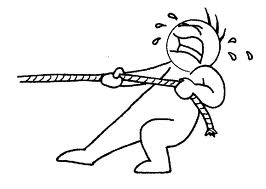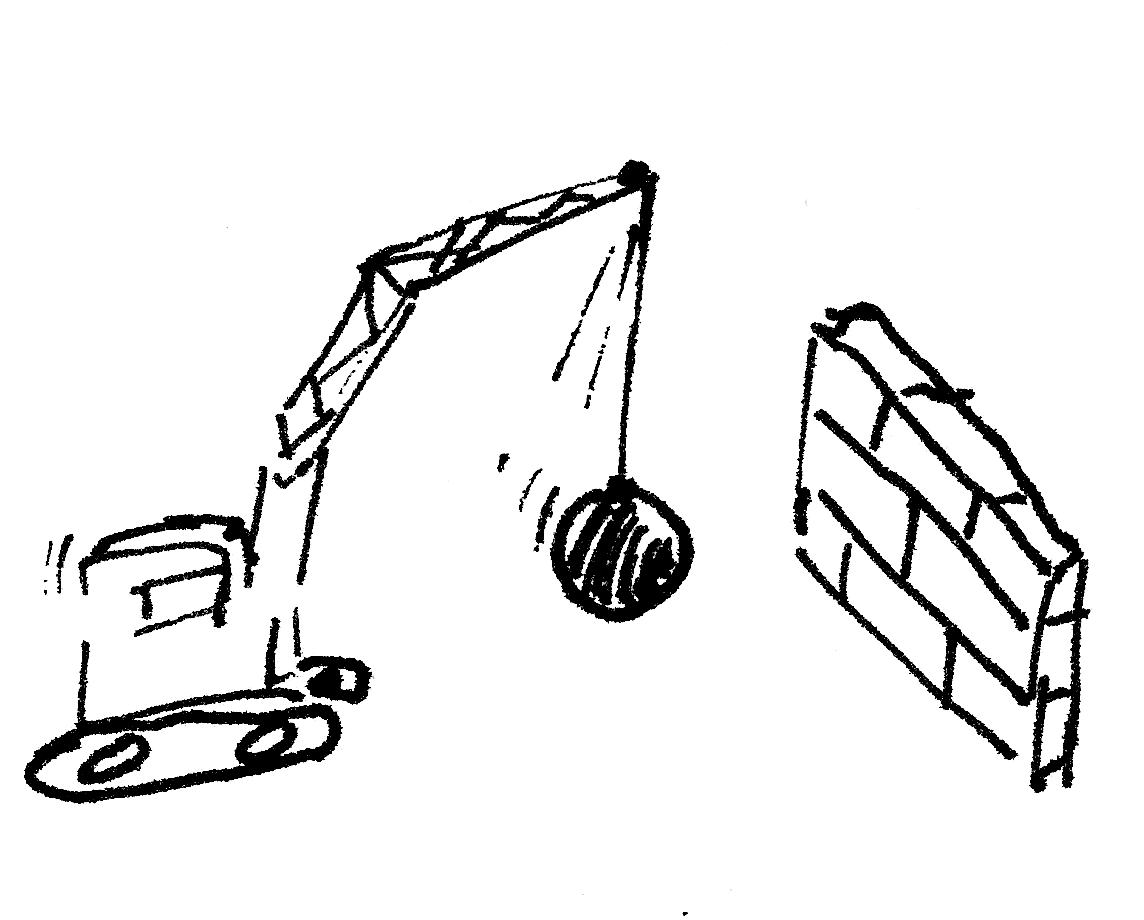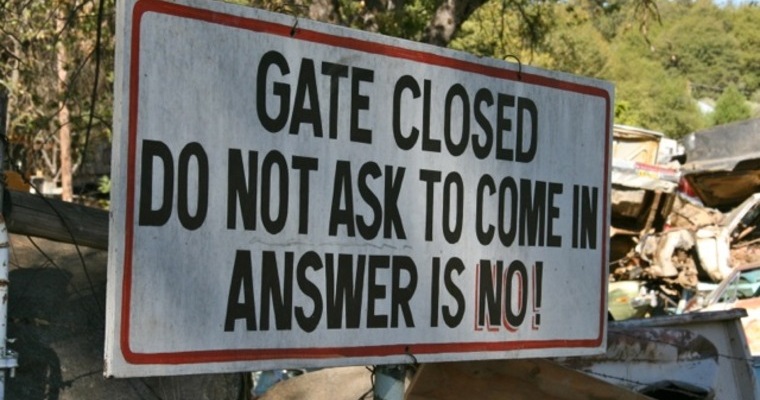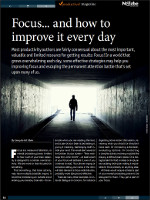There must be enough words written about procrastination to create a hole encyclopedia about it! Procrastinating is basically avoiding something you feel you should be doing. And it can seriously get in your way!
I'll resume here what I consider a rather fresh approach to the problem and possible solutions. Once more I believe the effective way is much closer to a clever understanding of its psychological origin than some super-disciplined enforcement. I call this topic execution blocking.
I'll resume here what I consider a rather fresh approach to the problem and possible solutions. Once more I believe the effective way is much closer to a clever understanding of its psychological origin than some super-disciplined enforcement. I call this topic execution blocking.
Execution Blocking - basics
Our brain is unquestionably well intended towards our own happiness. Always! No exceptions. Sometimes - ok, maybe many times - that same brain is a bit naive, and short-sighted in terms of his master plan for us. He may want to save us from doing a "painful" task without realizing the amount of suffering it will bring later not having done it. Yet, understanding the positive intention for the procrastination is key to unblocking action. And may well save us from some of those fierceful fights of discipline against ourselves, and corresponding tastes of frustration, guilt and pain...
All of us have had the experience of getting some valuable task stuck in our to-do list. The day passes by and "unbelievably" it just doesn't get done! Rushed explanations for the mystery may range from the classical lack of time to any sort of excuse around you - open space, interruptions, boss emergencies, your colleague's lack of planning, technology, etc... Full of accumulated pressure, we may urge: "I have to be more organized! I have to learn to say no! I have to be more disciplined, more focused!", and so on. Guilty feelings may arise, possibly helped by incredulous complains: "How the hell did you let two weeks go by on this?".
It's just so absolutely logical that you should have done it, you may fall into the only possible truth you see left: "I just can't make a simple delivery on time. I'm really no good with deadlines. I'm a failure." (if that's the case, you really want to recall the initial bold statement of this article: "Our brain is...")
All of us have had the experience of getting some valuable task stuck in our to-do list. The day passes by and "unbelievably" it just doesn't get done! Rushed explanations for the mystery may range from the classical lack of time to any sort of excuse around you - open space, interruptions, boss emergencies, your colleague's lack of planning, technology, etc... Full of accumulated pressure, we may urge: "I have to be more organized! I have to learn to say no! I have to be more disciplined, more focused!", and so on. Guilty feelings may arise, possibly helped by incredulous complains: "How the hell did you let two weeks go by on this?".
It's just so absolutely logical that you should have done it, you may fall into the only possible truth you see left: "I just can't make a simple delivery on time. I'm really no good with deadlines. I'm a failure." (if that's the case, you really want to recall the initial bold statement of this article: "Our brain is...")
The other end of the problem
There's nothing wrong with you. Nothing wrong with your competence. Y our brain is simply very professionally (and effectively) trying to protect you. Yes, in his naive short-sighted disfunctional style, but clearly well-intentioned. There's something potentially dangerous within the blocked issue. More exactly, something perceived by your brain as such. Being brave helps, but you might not get brave enough for it all. You are going against your cautious instinct. Your inner self is scared to go ahead. Probably with a good reason - within a logic of its own. Brave is good, but you want also to be working on this other end of the problem - what are you afraid of? - specially exploring uncertainty and fear of failing, so the potential danger gets more clearly perceived. Reassessing the "threat" will naturally recalibrate the opposing inner resistance. Remember: get your whole self to be on your side: don't allow inner enemies!
our brain is simply very professionally (and effectively) trying to protect you. Yes, in his naive short-sighted disfunctional style, but clearly well-intentioned. There's something potentially dangerous within the blocked issue. More exactly, something perceived by your brain as such. Being brave helps, but you might not get brave enough for it all. You are going against your cautious instinct. Your inner self is scared to go ahead. Probably with a good reason - within a logic of its own. Brave is good, but you want also to be working on this other end of the problem - what are you afraid of? - specially exploring uncertainty and fear of failing, so the potential danger gets more clearly perceived. Reassessing the "threat" will naturally recalibrate the opposing inner resistance. Remember: get your whole self to be on your side: don't allow inner enemies!
 our brain is simply very professionally (and effectively) trying to protect you. Yes, in his naive short-sighted disfunctional style, but clearly well-intentioned. There's something potentially dangerous within the blocked issue. More exactly, something perceived by your brain as such. Being brave helps, but you might not get brave enough for it all. You are going against your cautious instinct. Your inner self is scared to go ahead. Probably with a good reason - within a logic of its own. Brave is good, but you want also to be working on this other end of the problem - what are you afraid of? - specially exploring uncertainty and fear of failing, so the potential danger gets more clearly perceived. Reassessing the "threat" will naturally recalibrate the opposing inner resistance. Remember: get your whole self to be on your side: don't allow inner enemies!
our brain is simply very professionally (and effectively) trying to protect you. Yes, in his naive short-sighted disfunctional style, but clearly well-intentioned. There's something potentially dangerous within the blocked issue. More exactly, something perceived by your brain as such. Being brave helps, but you might not get brave enough for it all. You are going against your cautious instinct. Your inner self is scared to go ahead. Probably with a good reason - within a logic of its own. Brave is good, but you want also to be working on this other end of the problem - what are you afraid of? - specially exploring uncertainty and fear of failing, so the potential danger gets more clearly perceived. Reassessing the "threat" will naturally recalibrate the opposing inner resistance. Remember: get your whole self to be on your side: don't allow inner enemies!Uncertainty, decisions and fear of failing
 It seems most brains have had bad experiences with uncertainty and want to avoid it. In a simplified way, it looks like several mechanisms involved in unknown scenarios - decisions computation, anxiety, alertness tension, regret calculation, expectation management, etc... - must have been unpleasant enough, and enough times so that uncertainty and deciding got somehow labeled as "BAD". Of course fear of failing and regret come hand in hand with the responsability of risking a decision with uncertain consequences. Both the direct bad consequences of failing (the real ones) and the unpleasant process of regret (auto-punishment for not having done better) feed the avoidance of going ahead. And it can happen at micro level tasks like choosing something at a supermarket. Like an inner blocking warning: "WAIT! Don't just go and do a stupid choice!". These inner hesitations combined with a shouting email box and/or other input channels provide a recipe for productivity-disaster.
It seems most brains have had bad experiences with uncertainty and want to avoid it. In a simplified way, it looks like several mechanisms involved in unknown scenarios - decisions computation, anxiety, alertness tension, regret calculation, expectation management, etc... - must have been unpleasant enough, and enough times so that uncertainty and deciding got somehow labeled as "BAD". Of course fear of failing and regret come hand in hand with the responsability of risking a decision with uncertain consequences. Both the direct bad consequences of failing (the real ones) and the unpleasant process of regret (auto-punishment for not having done better) feed the avoidance of going ahead. And it can happen at micro level tasks like choosing something at a supermarket. Like an inner blocking warning: "WAIT! Don't just go and do a stupid choice!". These inner hesitations combined with a shouting email box and/or other input channels provide a recipe for productivity-disaster.Detecting avoidance behaviour
There are many types and sub-types of situations with blockin ingredients. I've selected 4 important origins, easy to recognize and to trigger corresponding unblocking procedures (presented in today's TRICK).
Beware that more than one can (and will) be found cumulatively in the same situation, and th
 ere will be variations also. The important thing is that in any of the following cases, a part of your brain will be linking the fact of "doing a particular issue" to an undesired movement towards "uncertainty" or "failure", which he wants to avoid. Naturally, that same brain will try to distract you from the issue and push you into doing something else, in unbelievably clever ways, even without you truly realizing it's happening - like when you find yourself cleaning the garage instead of finishing the thesis!
ere will be variations also. The important thing is that in any of the following cases, a part of your brain will be linking the fact of "doing a particular issue" to an undesired movement towards "uncertainty" or "failure", which he wants to avoid. Naturally, that same brain will try to distract you from the issue and push you into doing something else, in unbelievably clever ways, even without you truly realizing it's happening - like when you find yourself cleaning the garage instead of finishing the thesis!
TOP 4 EXECUTION BLOCKINGS
(solutions for each in today's TRICK)
(solutions for each in today's TRICK)
1. Ill defined tasks: are you lacking proper instructions?
This happens when you haven't decided the action verb for the task or some subtlety within. There's no action step physically visible to be achieved. Maybe the task is too wide to be called a task, maybe too long and you haven't yet chosen the first step or where to begin. Or you think you did it, but you are not exactly sure how you are going to do it. It's possible that you wrote "Contact client", but don't really know if you are going to call or send an e-mail. Or you wrote "Meet with department XX", but haven't yet decided when or exactly who should be present or didn't choose a date and time or even if you are going to send invitations by Outlook, send an e-mail or call each person. A task may seem action-oriented, but in fact small subtle indefinitions may prevent the triggering of a first physical action.
2. Not really sure this is the one: have you really decided that the task in question is definitely a good enough choice for investing your precious time? are you concerned it may not be the best call?
This could be because there's so much to do, that committing to one task means leaving other important ones pending and it doesn't seem right (this is also a matter of focus, as previously addressed). It's like you are not sure if it will optimize your investment of time. Imagine you are at the supermarket. You know there's a huge list of important things missing but you realize you only have 20$. While you may feel quite certain you need olive oil, you refrain from committing right away until you see a kind of global master plan make some sense within your limited budget. You may need the global picture first before starting. Note that in your to-do list, computing the master plan of where to invest your time may never end if you keep adding stuff to the list, and can be deceivably tempting to get rid of little tasks just to make the calculation easier.
Also look for some inner sense of uselessness. It could be a stupid report you know no one will read, or making a list of contacts you don't believe will work. If you don't believe it's worth it, and will only do it because you "kind of have to", you will strongly resist it until you've crossed all the deadlines and there's no option but to face it.
In both cases the blocking is trying to avoid a possible later regret of having wasted precious time in the wrong issue. Also note that, if you don't really know how long it will take - very long tasks -, your sense of worthiness (time/profit) may get impossible to calculate, which tends to get it blocked just in case (e.g. "organize photos").
3. There's uncertainty or need for decisions within the execution itself? Will you be moving towards possible surprises? Will you have do risk decisions along the way?
Maybe the task involves using a printer that sometimes doesn't work, or a software you're not familiar with. Or maybe you don't know if you have all the receipts and correct paper files so your IRS declaration gets blocked until the last minute. Or you have to go to the dentist, which sometimes is painful, others not, and so scheduling the appointment seems simple but it's not. Maybe you have to contact someone difficult to reach, that never answers your calls or emails and you're not sure if you're being too insisting. Maybe you have to talk about a difficult issue to your wife, whose reaction is unpredictable. Even sending a proposal to a prospect client may get you diving into an ocean of uncertainty for uncertain time, having to decide then the best moment for the follow up call. All these will produce a particular type of natural resistance.
4. Can you do it? Are you in doubt if you can complete the task successfully?
A wider variation of the previous one. Something seems too great to be achieved. It's too difficult. If you start it, maybe you won't be able do deal with what comes after. You may fail, or take the wrong decision, and everyone will think less of you. If you don't believe you can, you don't want to do go ahead towards failure, right? Maybe you can do it, but will regret later not having done it better - perfectly. Maybe it's not clear what success means in that particular issue. This type of blocking ranges from writing a book to an errands trip out of the office.
2. Not really sure this is the one: have you really decided that the task in question is definitely a good enough choice for investing your precious time? are you concerned it may not be the best call?
This could be because there's so much to do, that committing to one task means leaving other important ones pending and it doesn't seem right (this is also a matter of focus, as previously addressed). It's like you are not sure if it will optimize your investment of time. Imagine you are at the supermarket. You know there's a huge list of important things missing but you realize you only have 20$. While you may feel quite certain you need olive oil, you refrain from committing right away until you see a kind of global master plan make some sense within your limited budget. You may need the global picture first before starting. Note that in your to-do list, computing the master plan of where to invest your time may never end if you keep adding stuff to the list, and can be deceivably tempting to get rid of little tasks just to make the calculation easier.
Also look for some inner sense of uselessness. It could be a stupid report you know no one will read, or making a list of contacts you don't believe will work. If you don't believe it's worth it, and will only do it because you "kind of have to", you will strongly resist it until you've crossed all the deadlines and there's no option but to face it.
In both cases the blocking is trying to avoid a possible later regret of having wasted precious time in the wrong issue. Also note that, if you don't really know how long it will take - very long tasks -, your sense of worthiness (time/profit) may get impossible to calculate, which tends to get it blocked just in case (e.g. "organize photos").
3. There's uncertainty or need for decisions within the execution itself? Will you be moving towards possible surprises? Will you have do risk decisions along the way?
Maybe the task involves using a printer that sometimes doesn't work, or a software you're not familiar with. Or maybe you don't know if you have all the receipts and correct paper files so your IRS declaration gets blocked until the last minute. Or you have to go to the dentist, which sometimes is painful, others not, and so scheduling the appointment seems simple but it's not. Maybe you have to contact someone difficult to reach, that never answers your calls or emails and you're not sure if you're being too insisting. Maybe you have to talk about a difficult issue to your wife, whose reaction is unpredictable. Even sending a proposal to a prospect client may get you diving into an ocean of uncertainty for uncertain time, having to decide then the best moment for the follow up call. All these will produce a particular type of natural resistance.
4. Can you do it? Are you in doubt if you can complete the task successfully?
A wider variation of the previous one. Something seems too great to be achieved. It's too difficult. If you start it, maybe you won't be able do deal with what comes after. You may fail, or take the wrong decision, and everyone will think less of you. If you don't believe you can, you don't want to do go ahead towards failure, right? Maybe you can do it, but will regret later not having done it better - perfectly. Maybe it's not clear what success means in that particular issue. This type of blocking ranges from writing a book to an errands trip out of the office.
Remember: your mission involves deciding and taking chances. Some mistakes may be done, undoubtedly, and you should learn to be ok with that, because... most of the times staying stuck in indecision makes it worse!
Unblock yourself with the strength that "not risking" is failing your mission.
On my next article, I'll be finishing Chapter II - Action Oriented, analysing the impact of action oriented on interpersonal productivity (meetings, delegation, status reporting, ...).
Unblock yourself with the strength that "not risking" is failing your mission.
On my next article, I'll be finishing Chapter II - Action Oriented, analysing the impact of action oriented on interpersonal productivity (meetings, delegation, status reporting, ...).
Until then, try a TRICK!...
Gonçalo Gil Mata
www.WhatsTheTrick.com
NOW TRY A TRICK!...

|T| Detect and Unblock valuable tasks...>>
see more TRICKS - vote and comment on them!



